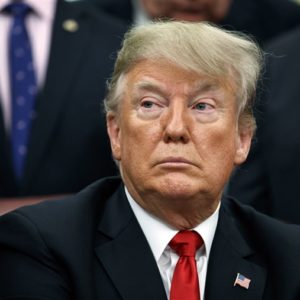Who would have imagined the United States, with some of the world’s most brilliant doctors and best hospitals, would soon become the nation with the world’s most cases of the coronavirus and the world’s most deaths from the disease?
The spread of the virus from just a few cases two months ago to more than a quarter million, from none dead to more than 70,000 and rising, is a shocking reflection on the American medical system, on domestic U.S. politics and indeed on President Trump.
True, it would be difficult to compare the United States to South Korea or Taiwan or Vietnam, all of which have managed to bring the number of deaths and new cases to almost none. The United States is far bigger, more diffused, culturally and ethnically, than smaller countries and entities that have laid down strict rules and enforced them rigorously.
Trump has to accept the blame, the responsibility, for much that has gone wrong in the United States.
No, there’s no chance he will acknowledge having made any mistakes. It’s far easier to accuse China, the source of the virus after it was first detected in the industrial center of Wuhan, and it’s also easier to attack the World Health Organization for having been too eager to accept the word of the Chinese in the early stages of what the WHO belatedly recognized for what it was, a pandemic.
The impression one gets from the U.S. response under Trump is that of a system that’s highly divided, that is basically unprepared, that remains uncertain of what to do and is in need of strong, centrally directed leadership. The problem breaks down in at least two distinct patterns.
First, as the virus spread, it soon became apparent that American medical facilities did not have enough supplies.
There were not enough face masks, not enough personal protective equipment, not enough test kits and certainly not enough ventilators, the breathing machines that are used as a last resort, too often not successfully.
Trump delayed in compelling factories to make much of this gear while the United States relied on imports that often arrived too little and too late.
Then, a related problem, the United States did not have the medicine, the tablets and pills, that might be useful in improving the condition of patients before scientists come up with an effective vaccine.
Trump has suggested two or three medicines that might or might not help and finally, in an idiotic display for which he will forever be remembered, suggested that maybe cleaning fluids like Lysol or Clorox, if ingested or injected, might do the trick.
He later said he was being sarcastic, but there was no sarcasm in his tone when he offered this suggestion against all warnings from the manufacturers as well as scientists and doctors.
Trump was right in saying U.S. pharmaceutical companies should be making their tablets and pills in the United States rather than trying to save money by having them manufactured overseas.
Surely the United States should not have to depend on factories in foreign countries to make essential products that would be critically needed by millions of people.
The second huge problem focuses on relationships between the federal government and the governments of all 50 American states.
The president can suggest guidelines, can set policies, has broad powers over the armed forces and federal agencies, but he has been in a constant battle with governors of individual states.
The problem has almost gotten out of control while Trump has gone from excessive optimism, by downplaying the significance of the virus, while failing to recognize the great danger that faced the American people.
It’s thought that Trump, had he acted swiftly, decisively, intelligently, to all the signs and warnings could have saved thousands of American lives, maybe tens of thousands. His slowness to respond has been a factor in the greatest catastrophe to confront the United States in decades, maybe since the Vietnam War, which cost fewer lives, maybe since World War II.
As authorities everywhere, especially in New York and a few other states, struggle to contain it, to keep it from spreading, Trump has appeared sympathetic with demands for easing controls that were belatedly put into place.
He even indicated he was on the side of demonstrators, some of them armed, who entered the Michigan state capitol building protesting the state governor’s order to keep shops closed, and he’s been all in favor of people going to beaches that were closed.
Obviously, whatever Trump does, he’s got his eyes focused on the presidential election. Joseph Biden, the likely Democratic Party candidate, is ahead of him in the opinion polls. Trump, still in command of the Republican Party despite signs of disagreement, believes he can get re-elected as the disease stops from spreading and he takes credit for reopening communities.
That’s going to be difficult, especially if there’s another outbreak. For Trump the disease is a political — not a medical — problem, and the American people are made to suffer for it.

